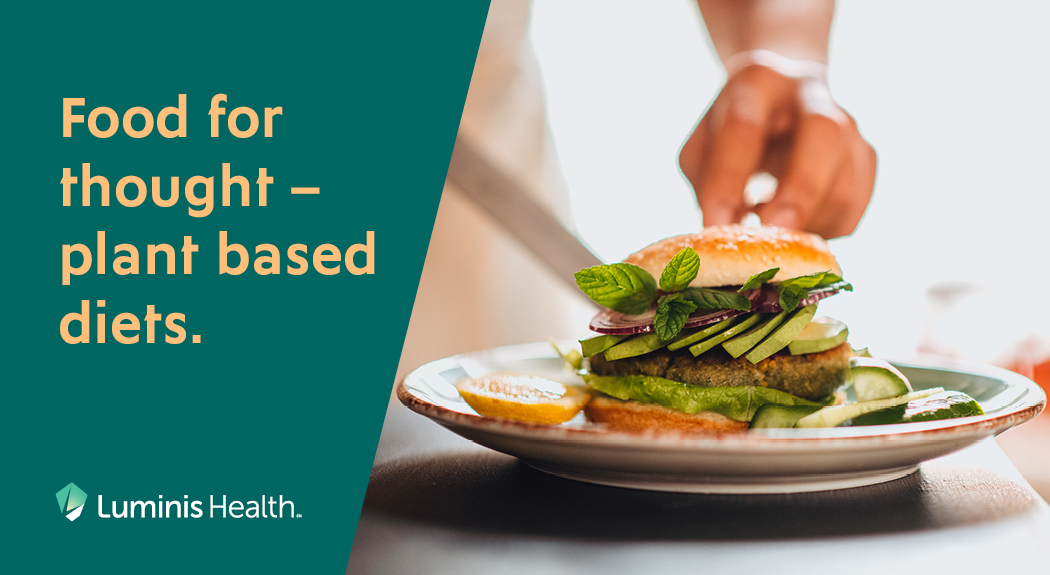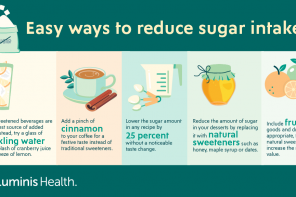Are you thinking of eating a more plant-based diet in the year ahead? You’re not alone. There is a lot of buzz about choosing to go meatless a few times a week, or even considering adopting a wholly plant-based diet. That’s because plant-based diets are, in general, healthier than diets heavy on meat and dairy products. People who eat plant-based diets have lower risks of cancer, heart disease and diabetes. They’re also less likely to be obese.
But ‘plant-based’ doesn’t always mean healthy. Vegan foods can sometimes be worse than meat alternatives. Here’s how to reap the rewards and avoid the pitfalls of a plant-based diet.
Watch Out For Sodium in Imitation Meats
Many plant-based burgers (which come frozen or fresh) aren’t always healthier than beef or chicken burgers. In some cases, they’re just as high in saturated fats and higher in sodium than meat-based burgers. For example, a four-ounce patty of one popular plant-based burger contains 380mg of sodium. By comparison, some frozen four-ounce beef burgers contain 75mg of sodium. Likewise, plant-based deli meat imitations can be just as salty as actual deli meat.
Diets high in sodium increase your risk of high blood pressure, heart disease and stroke. “Instead of replacing meat with fake meat substitutes, aim to get your protein from beans, lentils and tofu,” says Dr. Arsalan Sheikh, the medical director for diabetes and endocrinology at Luminis Health. If you’re switching to plant-based foods solely for health reasons, you’re better off eating lean, unprocessed meat than a salty imitation.
Not all foods labeled plant-based are natural
Those who find it hard to cook plant-based or vegetarian meals might turn to the frozen aisle, where they’ll find pizzas, samosas, veggie ‘nuggets’, veggie loaf and more. The problem? Frozen and processed vegan foods can be high in additives and preservatives. In fact, some plant-based meals can have more additives and thickeners to mimic the texture of meat.
One 2022 study found men who eat diets heavy in highly processed foods have a 30% higher risk of getting colorectal cancer. Another recent study found that people who ate diets heavy in processed foods were more likely to die of cardiovascular diseases.
It’s not clear exactly why processed foods are so bad for your health. One theory is that chemical ingredients added to foods to improve the shelf life, taste or texture of food could be more difficult for the body to break down. Plus, heavily processed foods are higher in sugar, salt and fat than less processed foods.
The secret to a healthy plant-based diet is to “avoid foods with long lists of ingredients, especially ingredients you don’t recognize,” says Dr. Sheikh. Rather than buying already-prepared meals, Dr. Sheikh recommends preparing plant-based foods at home with simple ingredients — like fresh or frozen vegetables, canned or dried beans and whole grains.
You can miss key nutrients
Meat has nutrients that can be hard, but not impossible, to find in plants. For example, iron, zinc and vitamin B12. Likewise, milk and yogurt are full of calcium and fortified with vitamin D. If you’re switching entirely to a plant-based diet, it’s a good idea to consult a dietician or nutritionist. They can help ensure you’re getting these important vitamins and minerals, whether through food or supplements. They can also make sure you’re getting enough protein through soy, beans and other plant-based foods.
“Whenever you’re making a big change to your diet, it’s a good idea to get expert advice,” says Dr. Sheikh. After all, changing what you eat is hard work. It helps to have someone in your corner.
Bottom line: Plant-based diets are healthier if you stick to the same tried-and-true advice as conventional diets
Can you improve your health by incorporating more plant-based meals into your life? Absolutely, but you’ll need to apply the same rules that apply to healthy, conventional diets. That means planning a diet rich in a variety of fruits and vegetables, not just picking up ‘plant-based’ burgers and assuming it’s good for you. It also means choosing whole grains and starches, such as brown rice or pasta, whole grain bread and sweet potatoes. Remember, too, that fried and highly processed foods should be “once in a while” foods, even if they have a ‘plant-based’ label on them.
 Arsalan Sheikh, DO, is the medical director for diabetes and endocrinology at Luminis Health.
Arsalan Sheikh, DO, is the medical director for diabetes and endocrinology at Luminis Health.



